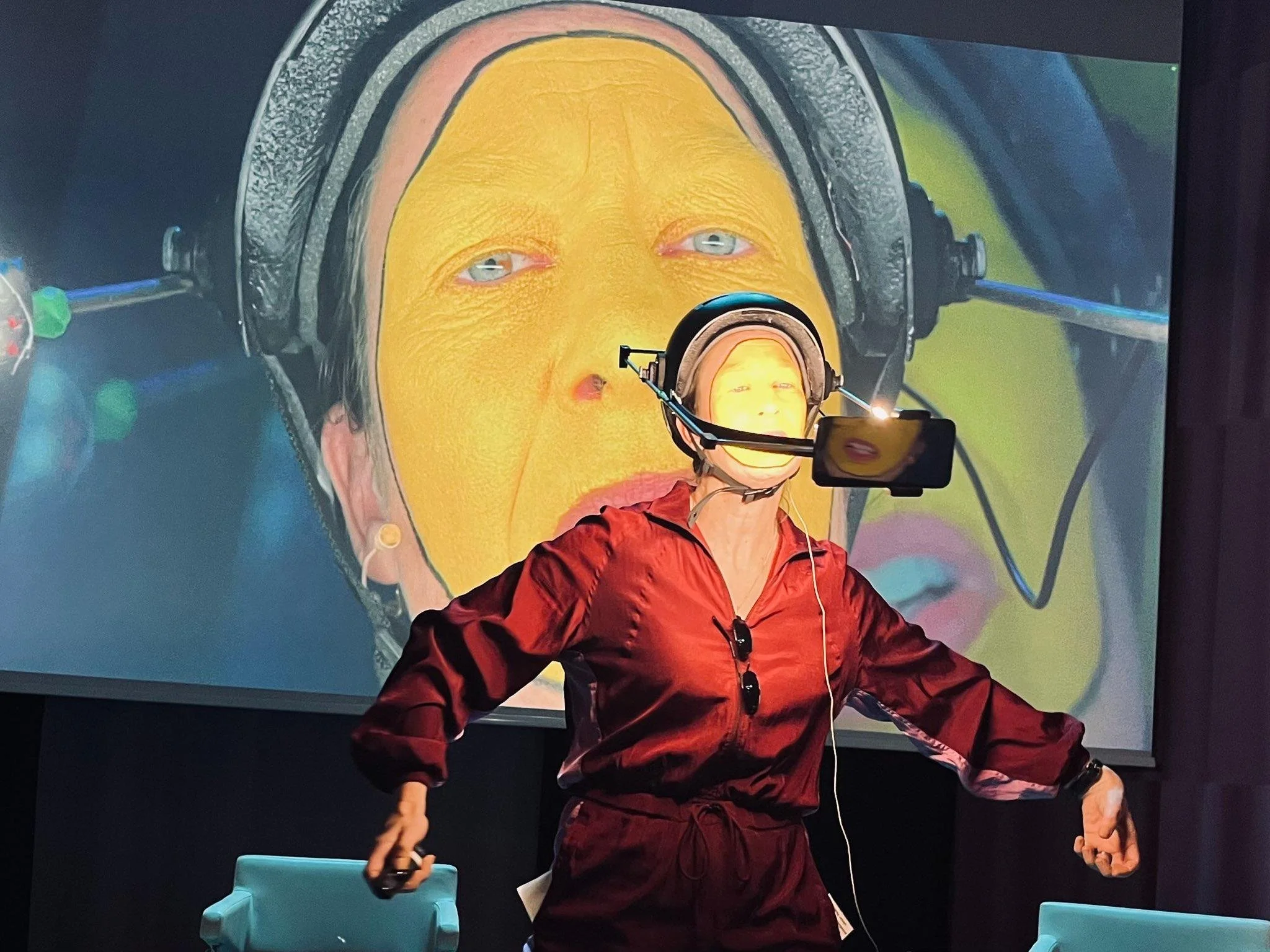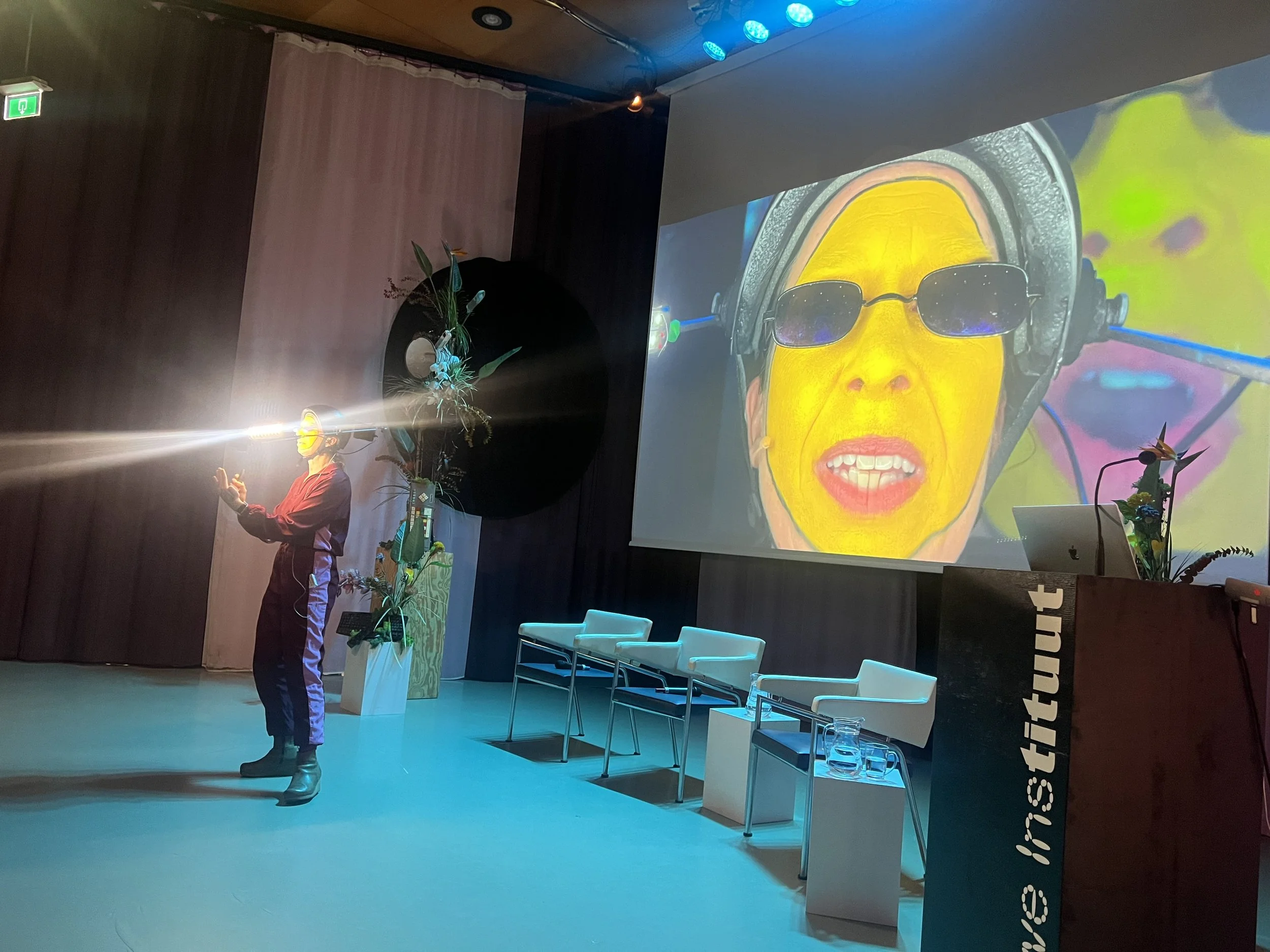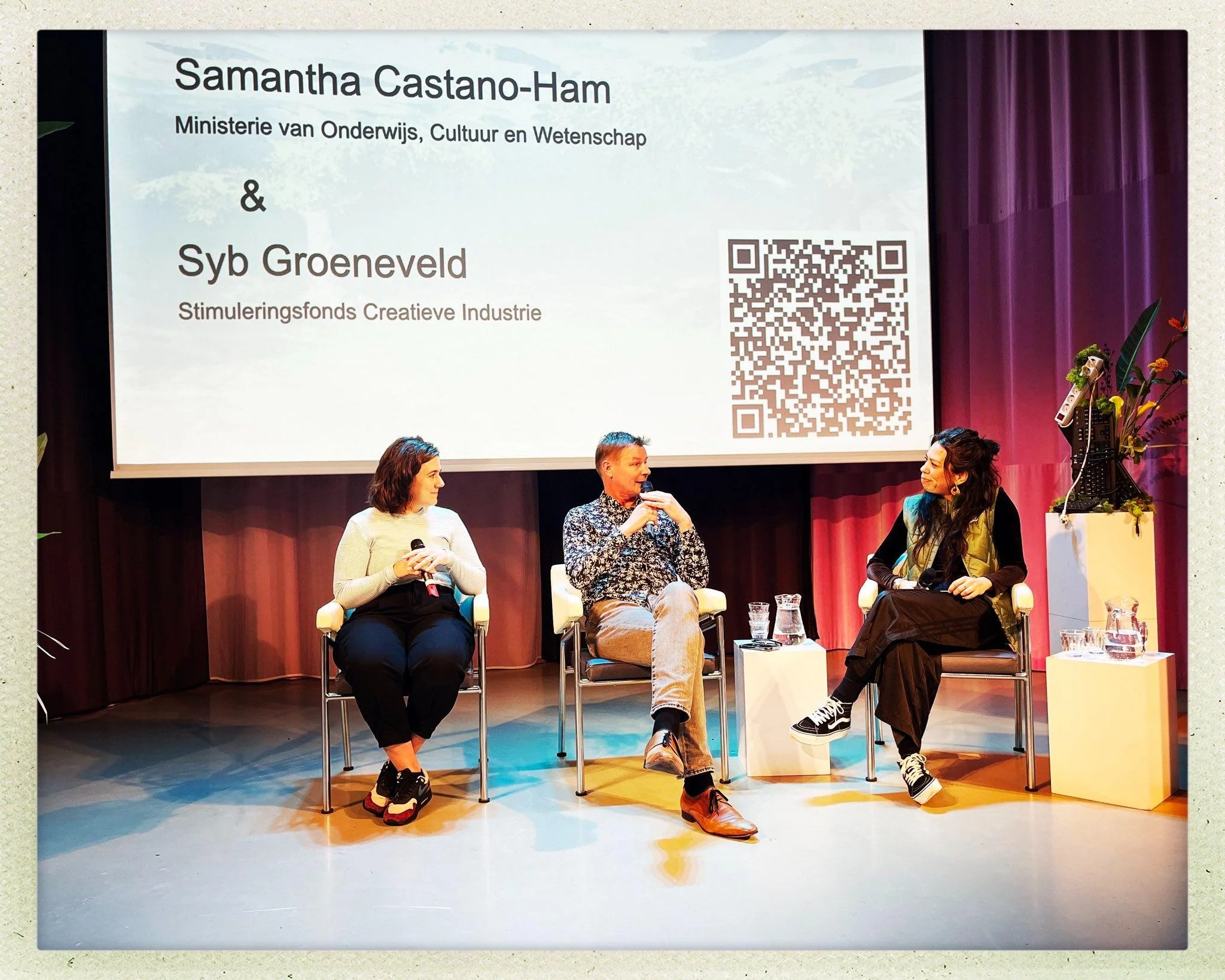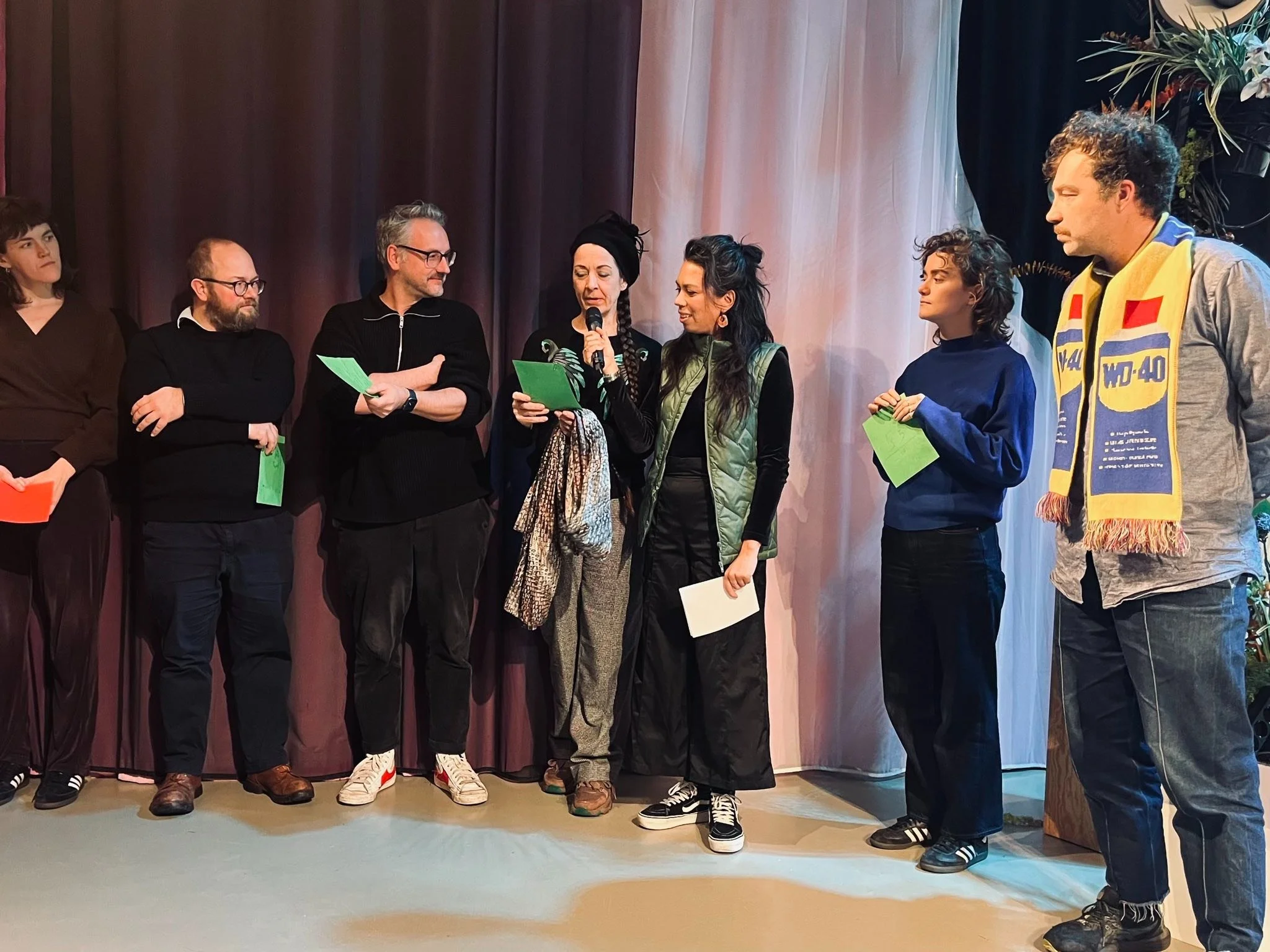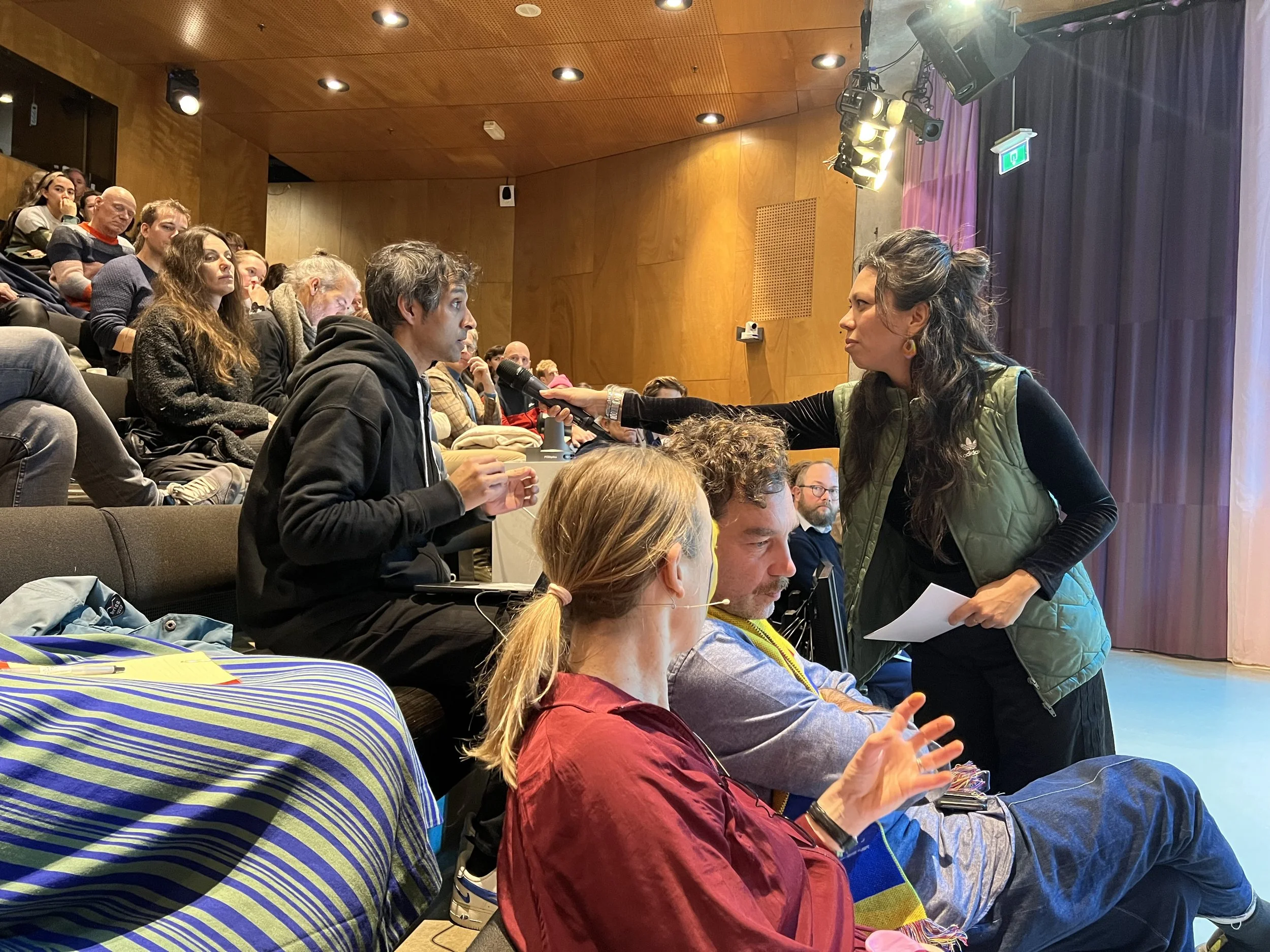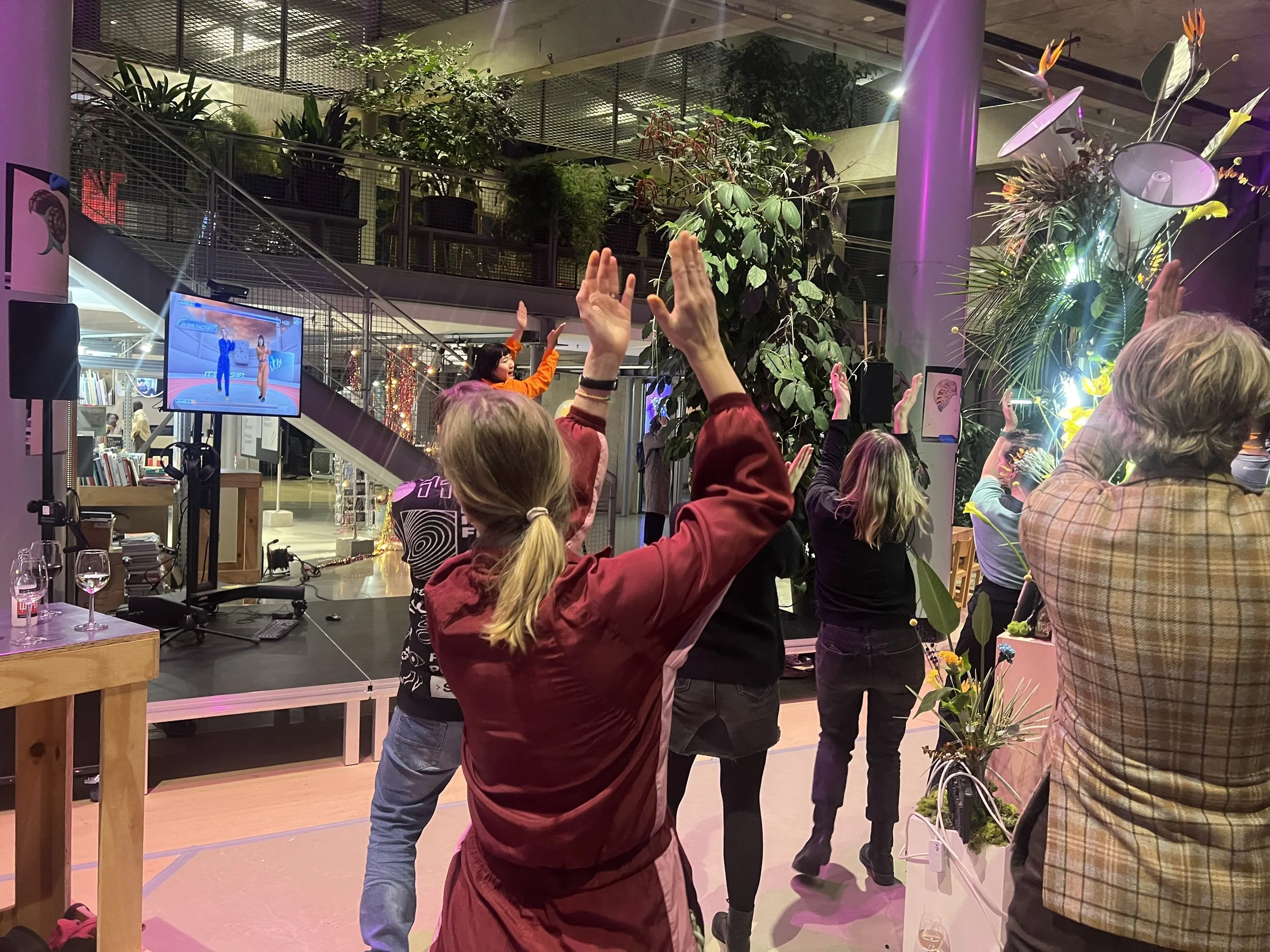Performance: Luna Maurer & Roel Wouters - Picture by Anna Pedroli
[English below]
Moonshot Digitale Cultuur Eindejaarsbijeenkomst
11 december 2023
Samenvatting
Op 11 december 2023 vond een eindejaarsbijeenkomst van de Moonshot Digital Cultuur plaats in het Nieuwe Instituut. Er waren ongeveer 80 mensen aanwezig die in brede zin een rol spelen in de Nederlandse digitale cultuursector: makers, producenten, onderzoekers en vertegenwoordigers van presentatie-, archief- en onderwijsinstellingen. Moderator was Dymphie Braun.
De bijeenkomst was een vervolg op de lancering van de Moonshot Digitale Cultuur in het Nieuwe Instituut (31 maart 2023) en de sessie die plaatsvond op het Cinekid festival in oktober 2023. Het doel van de initiatiefnemers – NFF, IDFA, Cinekid, Mu Hybrid Art House, Nieuwe Instituut en NAPA – is om de zichtbaarheid van de sector te vergroten en zo de kansen en knelpunten in de digitale cultuursector in kaart te brengen en een gedetailleerd beeld van de verschillende spelers en uitingsvormen op dit gebied.
De bijeenkomst werd mogelijk gemaakt door het Ministerie van Onderwijs, Cultuur en Wetenschap (OCW), in samenwerking met het Nieuwe Instituut.
OPENING & PRESENTATIES (1)
Luna Maurer & Roel Wauters
Het evenement werd geopend met een optreden van Luna Maurer en Roel Wouters. Luna Maurer droeg de tekst voor van hun nieuwe manifest, waarin ze ons oproept om frictie te omarmen en deze te faciliteren in onze interactie, design, technologie. Ondertussen tekende haar compagnon Roel Wouters met de hand een QR-code, die linkte naar de tekst van het manifest 'Designing Friction': https://designingfriction.com/
Josien Paulides (directeur Nieuwe Instituut) sprak over de extra financiering die OCW mogelijk heeft gemaakt als gevolg van de inspanningen van het Moonshot-initiatief en resulterend in de Pilot Culturele Immersive Production Voucher. Ze lichtte de Reboot tentoonstelling uit bij het Nieuwe Instituut en de ambities van het instituut op het gebied van digitale cultuur.
Samantha Castano-Van der Ham (beleidsmedewerker OCW) sprak over het belang dat het ministerie hecht aan het stimuleren van de digitale cultuursector. Daarbij ging zij in op beleidsaccenten uit het verleden, de opname van Digitale Cultuur-instellingen in de BIS (culturele basisinfrastructuur) en de uitdagingen waarmee zij te maken krijgen tijdens bezuinigingen. Castano-Van der Ham prees het Moonshot-initiatief voor het leveren van een belangrijke bijdrage, evenals vele andere bronnen van input over kansen en uitdagingen binnen de sector. Dit heeft geresulteerd in de ontwikkeling van een beleidsagenda voor Digitale Cultuur. OCW onderzoekt manieren om meer aandacht te creëren voor de breedte van de sector (onderwijs, talent, distributie en erfgoed).
Syb Groeneveld (directeur Stimuleringsfonds Creatieve Industrie) introduceerde de nieuwe pilot van een nieuwe regeling, de ‘Pilot Vouchers Culturele Immersieve Producties’, waarmee de specifieke uitdagingen op het gebied van distributie en presentatie voor immersieve producties worden aangepakt. De Voucherregeling, met categorieën voor artiesten/producenten en voor festivals/instellingen, is bedoeld om ondersteuning op korte termijn te bieden. Op basis van deze Pilot onderzoeken het Nederlands Filmfonds en het Stimuleringsfonds Creatieve Industrie wat er nodig is in 2024. Ook worden plannen voor meer structurele steun besproken.
Samantha Castano-Van der Ham benadrukte de waarde van deze Voucher: er zijn indrukwekkende producties ondersteund via de Immerse\Interact en Digital Culture subsidie, maar het is net zo belangrijk dat deze werken ook zichtbaarheid krijgen en het publiek bereiken.
Vragen over de Voucher Pilot kunt u sturen naar: immerseinteract@stimuleringsfonds.nl
Jet Parent (Platform ACCT) vertelde over de wijze waarop Platform ACCT de concretisering en implementatie van de Fair Practice Code stimuleert. Programma Fair PACCT heeft een speciale groep (Ketentafel) over Digitale Cultuur gelanceerd, waar gevestigde professionals en deelnemers samenwerken om betere arbeidsomstandigheden op het gebied van Digitale Cultuur te creëren. Tot nu toe zijn er vijf bijeenkomsten geweest, maar nog geen concrete resultaten geboekt. Momenteel ligt de nadruk vooral op het bespreken van de uitdagingen in de sector. De tijdsplanning per groep bedraagt 1,5 jaar: van opstart tot oplevering van praktische hulpmiddelen. Deze groep loopt tot december 2024.
Met hulp van Marije Baalman wordt gewerkt aan een handleiding over de tariefstructuur, en de verschillende onderdelen die daarin voorkomen:
Voor Digitale Cultuur bestaat dit nog niet;
Hierbij wordt ook gekeken naar voorbereidingstijd, reistijd, installatietijd etc.;
De groep heeft opgemerkt dat er een begeleidend document nodig is.
Alles wordt bijgehouden https://fairpacct.nl/ Als u suggesties wilt doen, kunt u een e-mail sturen naar:info@platformacct.nl
II. WERKSESSIE
Vervolgens werden de toekomstplannen van het Moonshot initiatief gepresenteerd, waarbij de nadruk werd gelegd op zichtbaarheid, sectorondersteuning en het aanmoedigen van samenwerking. Het publiek nam deel aan een feedbacksessie en suggereerde ideeën voor toekomstige initiatieven.
Input voor de Moonshot is verzameld tijdens expertsessies bij Cinekid, NFF, IDFA en het Nieuwe Instituut. De aanbevelingen om de positionering en professionalisering van de digitale culturele sector te versterken zijn onder meer:
1. Digitale cultuur integreren in het langetermijn cultuurbeleid met voldoende financiële middelen.
2. Zorgen dat subsidieprogramma’s beter aansluiten bij de digitale praktijk.
3. Het opzetten van een robuuste infrastructuur voor distributie en presentatie.
De ambities van het Moonshot zijn te lezen op https://www.moonshotdigitalecultuur.nl Dankzij de steun van OCW is de website van Moonshot onlangs vertaald naar het Engels.
Er is een Discord-kanaal opgezet voor de sector Digitale Cultuur:https://discord.gg/P28CgRKgSj Ideeën, nieuws, telefoontjes, vacatures, tips etc. kunnen hier gedeeld worden. Voel je vrij om deel te nemen aan dit open communicatieplatform.
Er zijn ook nog steeds een aantal posters beschikbaar van de illustratie ‘Het Digitale Cultuurveld mist wortels’ gemaakt door Rogier Klomp. Neem contact op via het contactformulier op deze website om er eentje te bestellen.
Er is behoefte aan een grotere zichtbaarheid als sector, waardoor naar buiten toe duidelijk wordt dat we een sector en netwerk op zich zijn. Er werden twee toekomstige werkmodellen voorgesteld:
I: Een Kennisbank in de vorm van een digitaal magazine. Het gaat om een verzameling kennis waaraan wij kunnen bijdragen en die een externe functie heeft.
II: Evenementen, gericht op de zichtbaarheid van onze sector. Maar ook intern: wat hebben we nodig op dit gebied, wat zijn de volgende stappen, strategieën etc.?
Op basis van deze modellen nam het publiek deel aan een live ideeënsessie waar tips en suggesties werden opgeschreven en anoniem gestemd.
Er zijn meerdere kaarten met hoge scores publiekelijk gedeeld, en daar hebben we een top 10 van gemaakt:
In categorie I: (Kennisbank)
“Het organiseren van fysieke bijeenkomsten om spelen en oefenen in de samenleving te stimuleren”
“Immersieve projecten hebben speciale tentoonstellingsruimtes nodig, zoals bibliotheken, musea of pop-ups in leegstaande gebouwen.”
“Organiseer een soort Ars Electronica, een jaarlijkse festival voor immersieve ervaringen, inclusief optredens bedoeld voor een klein publiek. In een stad als Utrecht, in de binnenstad en in semi-publieke ruimtes.”
“Een community-evenement voor een meer intern publiek, met jaarlijks een kerstdiner in de buitenlucht voor de hele sector, waarbij live optredens een essentieel onderdeel zijn (plus publiek, plus glühwein of warme chocolademelk).”
“Er zijn al te veel evenementen, er is meer ruimte nodig voor onderzoek.”
“Er is een fysieke plek nodig voor immersieve projecten, het is belangrijk om een vaste plek te hebben.”
In categorie II: (Evenementen)
“Meer kennis en beleid rond digitale media op basisscholen en middelbare scholen, over de heilzame en schadelijke kanten ervan.”
“Meer informatie over de toegankelijkheid en beschikbaarheid van Digitale Cultuur-projecten, waar je Digitale Cultuur-projecten kunt vinden en hoe je daar kunt komen.”
“Mogelijkheden voor intersectorale samenwerkingen, overzicht van calls, matchmaking en evenementen van instellingen.”
“Diversiteit en inclusiviteit in alle lagen van de Digitale Cultuur en kortere lijnen tussen producties en de Moonshot.”
In gesprek met het publiek
III. PRESENTATIES (2) & CONCLUSIE
Kexin Hao - Future Dance Nostalgia - Photo Paulien Dresscher
Performer Kexin Hao besprak haar werk 'Future Dance of Nostalgia', ontwikkeld tijdens een residentie bij iii in Den Haag. De dans nodigt het publiek uit om een choreografie uit te voeren die is afgeleid van pre-industriële, zware fysieke arbeid en werklieden, geabstraheerd door middel van motion tracking-technologie. Kexin Hao wil onderzoeken of onze bewegende lichamen kunnen dienen als een levend archief, waarbij de nadruk wordt gelegd op de beweging van het menselijk lichaam naast machines. Aan het einde van de Moonshot-bijeenkomst kon het publiek deelnemen aan een live uitvoering van het werk.
Bart Hess in gesprek met Dymphie Braun
In een interview met Dymphie Braun vertelde kunstenaar Bart Hess over zijn artistieke praktijk en zijn fascinatie voor het lichaam, verhalen vertellen en experimenteren. Voor het VR-project ‘Wave’, gemaakt voor Het Nationale Ballet, verkende hij de immersieve ervaring door te spelen met de manipulatie van het lichaam door middel van herhaling en vertraging. Het publiek had aan het einde van de Moonshot-bijeenkomst de mogelijkheid om het werk te ervaren.
Youssef Louakili (directeur Media en Creatieve Industrie, OCW) sprak zijn commitment uit voor het ondersteunen van Digitale Cultuur en benadrukte daarbij de potentie ervan in het onderwijs. Hij stimuleerde het leggen van verbindingen tussen cultuur, technologie en onderwijs, bijvoorbeeld door samenwerking tussen de Digitale Cultuursector en bibliotheken.
Slot
In haar slotopmerkingen benadrukte Cathy Brickwood (Nieuwe Instituut + Moonshot) het belang van langetermijninvesteringen in kennis, beleidsontwikkeling, internationale samenwerking en onderzoek op het gebied van digitale cultuur.
[Scroll up for Dutch]
Moonshot Digital Culture End-of-year meeting
11 December 2023
Summary report
On December 11, 2023, an end-of-year meeting of the Moonshot Digital Culture took place at the Nieuwe Instituut. Participants were approximately 80 people who play a role in the Dutch digital culture sector in a broad sense: makers, producers, researchers, and representatives of presentation, archive and educational institutions. Moderator was Dymphie Braun.
The meeting was a follow-up to the launch of the Moonshot Digital Culture at the Nieuwe Instituut (March 31, 2023). The aim of the initiators – NFF, IDFA, Cinekid, Mu Hybrid Art House, Nieuwe Instituut and NAPA – is to increase the visibility of the sector, and in this way map out the opportunities and bottlenecks in the digital culture sector and to provide a detailed picture of the different players and forms of expression in this field.
The meeting was made possible by the Ministry of Education, Culture and Science (OCW), in collaboration with the Nieuwe Instituut.
OPENING & PRESENTATIONS (1)
The event opened with a performance by Luna Maurer and Roel Wouters. Luna Maurer recited the text of their new manifesto, in which she calls on us to embrace friction and facilitate it in our interaction, design, technology. In the meantime, her associate Roel Wouters drew a QR code by hand, which linked to the text of the manifesto 'Designing Friction': https://designingfriction.com/
Josien Paulides (director Nieuwe Instituut) spoke about the additional funding made possible by OCW as a result of the efforts of the Moonshot initiative, and resulting in the Cultural Immersive Production Voucher Pilot. She highlighted the Reboot exhibition at Nieuwe Instituut and the institute’s ambitions in the digital culture field.
Samantha Castano-Van der Ham (policy officer OCW) spoke about the importance that the ministry attaches to stimulating the digital culture sector, detailing past policy emphases, the inclusion of Digital Culture institutions in the BIS (cultural basic infrastructure), and challenges faced during budget cuts. Castano-Van der Ham praised the Moonshot initiative for making an important contribution, as well as many other sources of input about opportunities and challenges within the sector. This has resulted into the development of a policy agenda for Digital Culture. OCW is looking into ways of creating more attention for the breadth of the sector (education, talent, distribution and heritage).
Syb Groeneveld (director Creative Industries Fund NL) introduced the Voucher Pilot scheme, addressing the specific challenges regarding distribution and presentation for immersive productions. The Voucher scheme, with categories for artists/producers and festivals/institutions, aims to provide short-term support. Based on this Pilot, the Netherlands Film Fund and Creative Industries Fund NL are looking into what is needed in 2024, plans for more structural support are also being discussed. Samantha Castano-Van der Ham emphasised the value of this Voucher: impressive productions have been supported through the Immerse\Interact and Digital Culture grant, but it is just as important that these works are also given visibility and reach audiences. Questions about the Voucher Pilot can be sent to: immerseinteract@stimuleringsfonds.nl
Jet Parent (Platform ACCT) talked about the way Platform ACCT encourages the concretisation and implementation of the Fair Practice Code. Programme fairPACCT has launched a special group (Ketentafel) on Digital Culture, where established professionals and participants are working together to create better working conditions in the field of Digital Culture. So far, there have been five meetings, but no concrete outcomes to date. Currently, the main focus is on discussing the challenges in the sector. The time planning per group is 1.5 years: from start-up to delivery of practical tools. This group runs until December 2024. With the help of Marije Baalman, work is underway on a manual on rates structure, and different components that exist within it:
This does not yet exist for Digital Culture;
This also looks at preparation time, travel time, installation time, etc.;
The group has noted that an accompanying document is needed.
Everything is tracked at https://fairpacct.nl/ If you wish to make suggestions, you can send an email to: info@platformacct.nl
II. WORKING SESSION
Next up, Moonshot's future plans were presented, emphasising visibility, sector support, and encouraging collaboration. The audience participated in a feedback session, suggesting ideas for future initiatives.
Input for the Moonshot was gathered during expert sessions at Cinekid, NFF, IDFA and the Nieuwe Instituut. The recommendations to enhance the positioning and professionalisation of the digital cultural sector include:
Integrating digital culture into the long-term cultural policy with adequate financial resources.
Ensuring that subsidy programmes align more effectively with digital practices.
Establishing a robust infrastructure for distribution and presentation.
The Moonshot can be reviewed at https://www.moonshotdigitalecultuur.nl
Thanks to the support of OCW, the Moonshot website has recently been translated into English.
A Discord channel has been set up for Digital Culture sector: https://discord.gg/P28CgRKgSj
Ideas, news, calls, vacancies, tips, etc., can be shared here. Join the conversation.
There are still posters available of the illustration ‘Het Digitale Cultuurveld mist wortels’ made by Rogier Klomp.
There is a need for an increase in visibility as a sector, making it clear to the outside that we are a sector and network in itself. Two future working models were suggested:
I: A Knowledge Base in the form of a digital magazine. This will be a collection of knowledge to which we can contribute and will have an external function.
II: Events, aimed at the visibility of our sector. But also internally, what do we need within this field, what are the next steps, strategies, etc.?
Based on these models, the audience took part in a live idea session where tips and suggestions were written down and anonymously voted on.
Several cards with high scores were shared publicly, and we came up with a top 10:
In category I (Knowledge Base):
“Organising physical meetings to encourage play and practice in society”
“Immersive projects need designated display spaces such as libraries, museums, or pop-ups in vacant buildings.”
“Organise a kind of Ars Electronica, an annual festival for immersive experiences, including performances meant for small audiences. In a city like Utrecht, within the city centre and in semi-public spaces.”
“A community event for a more internal audience, with an annual outdoor Christmas dinner for the whole sector, where live performances are an essential part (plus audience, plus mulled wine or hot chocolate).”
“There are already too many events, more space is needed for research.”
“A physical place for immersive projects is needed, it is important to have a permanent place.”
In category II (Events):
“More knowledge and policy on digital media in primary and secondary schools, about the beneficial and harmful aspects.”
“More information on the accessibility and availability of Digital Culture projects, where you can find Digital Culture projects, and how you can get there.”
“Opportunities for intersectoral collaborations, overview of calls, matchmaking and events from institutions.”
“Diversity and inclusion in all layers of Digital Culture and shorter lines between productions and the Moonshot.”
III. PRESENTATIONS (2) & CONCLUSION
Artist Kexin Hao discussed her work "Future Dance of Nostalgia," developed during a residency at iii in The Hague. This dance game invites the audience to perform a choreography derived from pre-industrial, heavy physical labour, and work songs, abstracted through motion tracking technology. Kexin Hao aims to explore whether our moving bodies can serve as a living archive, emphasising the movement of the human body alongside machines. The audience was able to participate in a live performance of the work at the end of the Moonshot gathering.
In an interview with Dymphie Braun, artist Bart Hess talked about his artistic practice and his fascination for the body, storytelling and experimentation. For the VR project "Wave", created for Dutch National Ballet, he explored the immersive experience by playing with the manipulation of the body through repetition and delay. The audience had the possibility to experience the work at the end of the Moonshot gathering.
Youssef Louakili (director Media and Creative Industry, OCW) expressed his commitment to supporting Digital Culture, highlighting its potential in education. He encouraged building connections between culture, technology, and education, for instance through collaboration between the Digital Culture sector and libraries.
In her concluding remarks, Cathy Brickwood (Nieuwe Instituut + Moonshot) emphasised the importance of long-term investments in knowledge, policy development, international collaboration, and research in Digital Culture.
